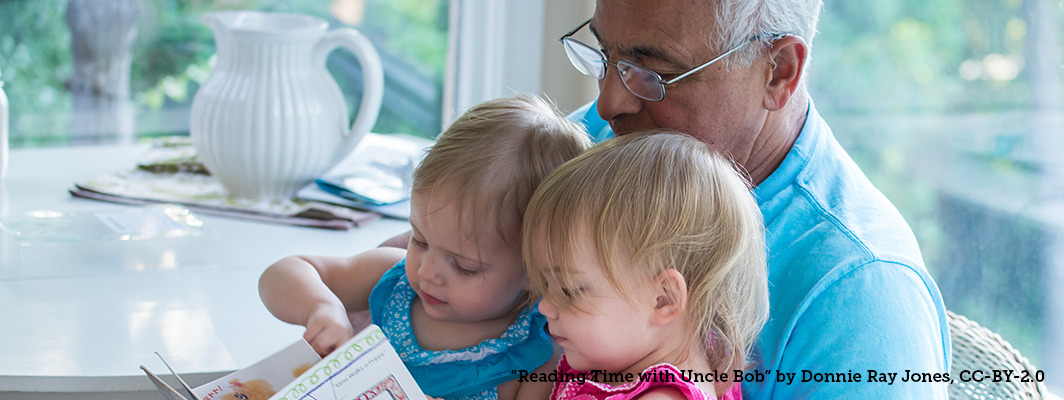
January 5, 2017 | By Mark Tomlinson, Lynne Murray and Peter Cooper
This article was originally published on The Conversation. Read the original article.
Illiteracy is a global concern. Research suggests that 175 million young people, largely from poor countries and regions, lack basic literacy skills.
This has wide-ranging negative effects, both for individuals and society at large. Illiteracy has been shown to contribute to poor health. A World Literacy Foundation study estimated that illiteracy costs the global economy more than $1 trillion a year through lost job opportunities.
But our research suggests that there is one simple way to equip your children for a life of literacy from their infancy: share picture books with them.
There is already a compelling body of evidence from high income countries which shows that children’s language development and literacy skills are facilitated by book sharing with a carer, beginning in infancy. There seems to be something special about the process of book sharing.
The evidence shows that sharing picture books with infants delivers the largest benefit in terms of their cognitive development. Carers name objects for the infant and acknowledge, extend and elaborate on the focus of the infant’s interests.
Recent research has shown that when carers are provided with training in sensitive book sharing (so-called dialogic reading), there are substantial improvements in infant sustained attention. This improvement is directly related to the carers’ increased sensitivity, warmth and responsiveness. Importantly, it has been found that early infant sustained attention is a reliable predictor of later child IQ.
We have developed a book sharing training programme and used it in Khayelitsha, a township outside Cape Town, South Africa.
Caregivers and their infants met weekly in groups of three to five with a trainer over two months. During these sessions the trainer conveyed information about the process of sensitive book sharing, modelled key skills and facilitated and encouraged caretakers in good practice.
Each session began with a 30 minute presentation with illustrative video clips. This was followed by a 10 to 15 minute session of individual attention. Typically, during these individual sessions, the trainer would share the book with the infant herself, modelling behaviours.
The training programme includes the following basic components of dialogic reading:
Active child participation: The infant should be encouraged to actively participate (not simply listen) and the carer is encouraged to follow cues from the infant.
Pointing and naming: The carer is encouraged to point and name the objects in the picture that the infant is looking at (or patting/banging/scratching).
Active questioning: For words the infant understands, the carer is encouraged to prompt the infant to point to a particular object or character, asking questions starting with “Where is the…?”, or “Can you find the …?”
Active questioning using “what” or “who” style questions: Later, when the infant knows how to say the word for an object, the carer is encouraged to ask questions like “What is this?”, pointing to the relevant object in the picture.
Active linking of book content to the infant’s real world: The carer is encouraged to link the content illustrated in the book to the infant’s own experience.
We examined the impact of the training by comparing two groups of carers and children in the township. One group of carers, mostly mothers, received the training while the other did not. After eight weeks there were major differences between the two groups.
Our study, published in the Journal of Child Psychiatry and Psychology, found that trained carers were not only much better at book sharing: when they played with their infants without books, they were also more sensitive and responsive. The children, too, showed dramatic improvement. Their vocabulary increased and their comprehension improved; and their sustained attention showed a marked increase. Indeed, this increase was equivalent to increasing their intelligence by 16 IQ points. In addition, the children became more sociable and displayed more empathy.
Earlier this year South African Deputy President Cyril Ramaphosa said that fewer than 5% of parents in South Africa read to their children. Our study shows how important book sharing can be.
It also demonstrates that it is possible to introduce sensitive book sharing to contexts where this activity is unknown. Doing this markedly improves child language and attention. Providing training in sensitive early book sharing could play a major role in boosting the educational prospects of children living in poverty.
To take our study further, we will next look at the indications that book sharing could benefit the carer-child relationship and child socio-emotional development. The new trial, funded by the Sexual Violence Research Initiative at the Medical Research Council, will start in Khayelitsha in early 2016.
By Lauren McMahon and Heather Dowd